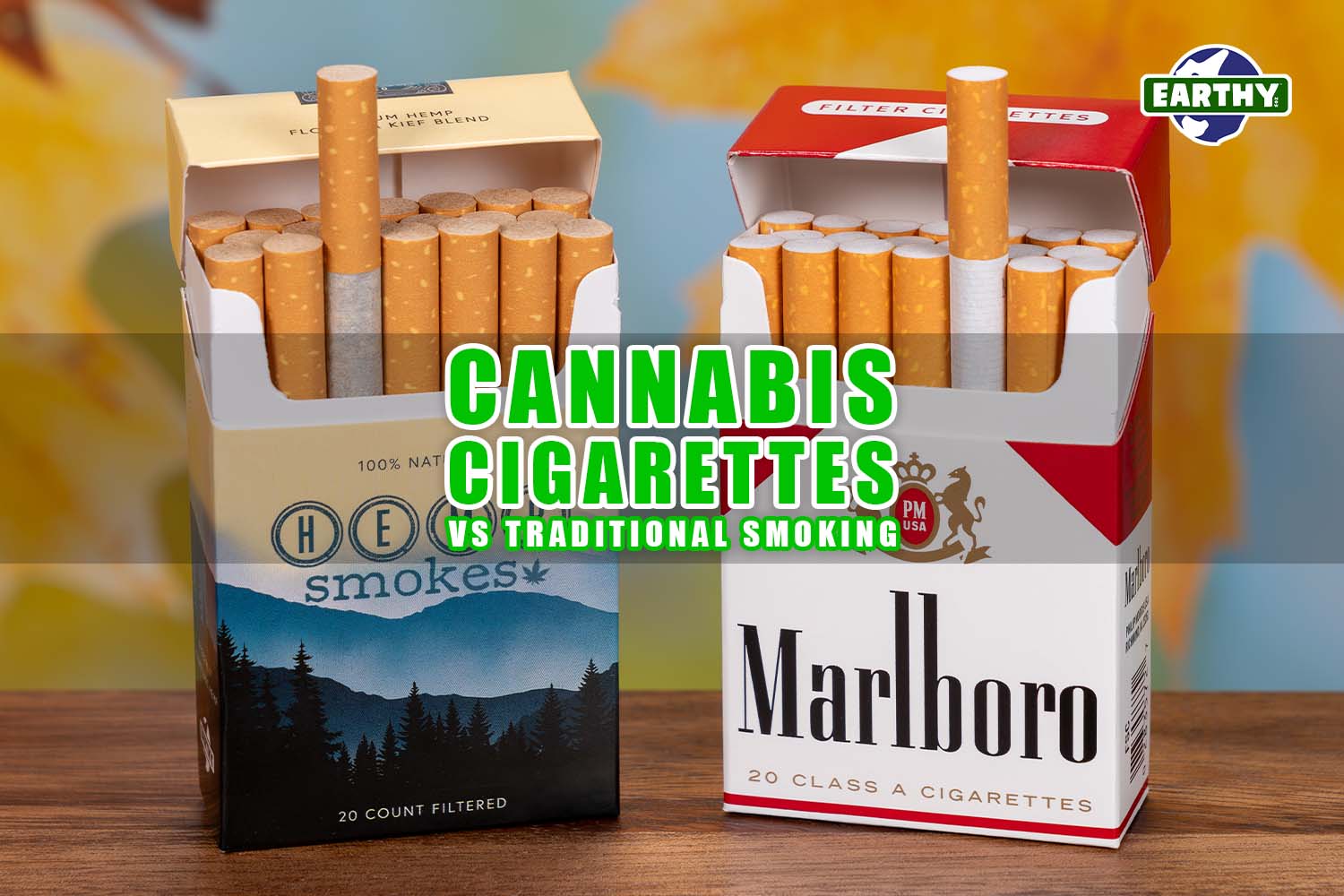The landscape of smoking choices has evolved significantly over the years. While traditional tobacco smoking has long been a prevalent habit for many, the emergence of cannabis cigarettes, also known as hemp smokes, offers new options to smokers. This article will delve into the world of cannabis cigarettes and traditional smoking methods. Additionally, we’ll explore their characteristics, health implications, legal aspects, environmental impact, and more. By the end, you will have a comprehensive understanding of cannabis cigarettes vs traditional smoking, making you better equipped to make informed decisions.
What are cannabis cigarettes?
Cannabis cigarettes, commonly referred to as hemp smokes when made from hemp rather than marijuana, are a smoking alternative made from the cannabis plant. Unlike traditional tobacco cigarettes, hemp smokes contain low levels of Delta-9 THC (Delta-9 tetrahydrocannabinol), the psychoactive compound responsible for the “high” associated with marijuana. Instead, they are typically high in CBD (cannabidiol), a non-psychoactive component known for its potential benefits [1].
These cigarettes are crafted to resemble traditional cigarettes in size and shape, providing a familiar smoking experience. Moreover, they are a safer and milder alternative for those seeking the potential benefits of cannabis without the intoxicating effects of high-THC strains.
Traditional smoking: an overview
Traditional smoking, which primarily involves the use of tobacco cigarettes, has a long history in many cultures worldwide. However, tobacco cigarettes contain nicotine and other harmful chemicals associated with numerous health risks, including heart disease, lung cancer, and chronic obstructive pulmonary disease (COPD) [2].
While tobacco smoking has been widely practiced for centuries, cannabis smoking also has a rich cultural and historical background. Various societies have used marijuana for medicinal and recreational purposes for millennia, and its consumption methods have evolved alongside changing societal attitudes and legal regulations [3].
Hemp Smokes Review: Best Cannabis Cigarettes
Diving into tobacco and cannabis history
The histories of tobacco use and cannabis smoking are intertwined, each with its unique cultural, social, and health implications. Tobacco use has a deep-rooted history, dating back to Native American civilizations who cultivated and smoked tobacco for ceremonial and medicinal purposes. It was later introduced to Europe by early explorers, eventually becoming a global commodity [4]. However, as the popularity of smoking tobacco spread, so did concerns about its detrimental pulmonary effects and adverse impact on lung health. The widespread use of cigarettes, often associated with increased risk of lung diseases, made tobacco a focus of public health efforts to curb its usage. The health risks of cigarette smoke, which contains carcinogens and causes airway inflammation, have been extensively studied, leading to numerous anti-smoking campaigns [2].
In contrast, cannabis smoking has a history steeped in both medicinal and recreational practices. Cannabis, used for centuries in various cultures, was considered a sacred plant with documented medical purposes. Its positive effects, including increased appetite, relaxation, and altered mental states, have been recognized and utilized for medical and mental health purposes [3]. However, the classification of cannabis as an illegal substance in many parts of the world led to the illicit drug trade and concerns about its impact on mental health [5]. Today, as attitudes toward marijuana and tobacco evolve, the debate over the effects of marijuana continues, emphasizing the complex relationship between marijuana and tobacco and the need for balanced public health approaches.
Guide to THC Cigarettes: Embracing Low-THC and High-CBD
Health implications
When comparing the health implications of cannabis cigarettes vs. traditional smoking, a stark contrast emerges. For example, traditional tobacco cigarettes pose severe health risks. Smoking tobacco has been linked to lung cancer, heart disease, chronic bronchitis, and a host of other lung disorders. Additionally, exposure to tobacco smoke harms both smokers and non-smokers through inhaling toxic tobacco smoke condensates [2].
In contrast, no substantial evidence suggests that smoking cannabis cigarettes, particularly those with low THC and high CBD content, carries health risks nearly as severe [6]. However, it is important to note that inhaling any type of smoke, whether from tobacco or marijuana, can irritate the respiratory system and potentially lead to acute bronchitis or exacerbate existing respiratory conditions [6].
The Rise of Hemp Smokes: A Sustainable Wellness Alternative
Experience & effects
The experience and effects of cannabis cigarettes vs. traditional smoking smoking cannabis differ significantly. Traditional tobacco cigarettes primarily deliver nicotine, which creates a stimulating and addictive effect. For example, cigarette smokers often report increased alertness, improved concentration, and reduced appetite [7].
On other other hand, here are some of the experiences associated with hemp smokes:
- Benefits: Some individuals use low THC, high CBD hemp smokes for potential wellness benefits. However, consulting with a healthcare professional before using them for specific conditions is essential [8].
- Enjoyability: Hemp smokes may be better than traditional tobacco cigarettes in terms of effects because of their lack of addictive qualities. For example, hemp smokes do not contain nicotine, so it may be easier to smoke less. Most hemp smokers do not smoke as much and may have fewer health risks compared to those who smoke traditional tobacco cigarettes. However, any form of smoking can irritate the respiratory system, so non-smoking alternatives should also be considered [6].
Delta-9 THC Cigarettes: A New Trend?
Legal aspects of cannabis cigarettes vs. traditional smoking
The legal landscape surrounding cannabis cigarettes and traditional tobacco cigarettes varies widely from one region to another. While tobacco products are regulated and taxed in most countries, cannabis laws are still evolving. In some places, marijuana is legal for medical and/or recreational use, while in others, it remains a prohibited substance. However, the 2018 Farm Bill differentiated hemp from marijuana, defining it as cannabis with 0.3 % or less Delta-9 THC. Now, most states allow hemp and hemp products, including hemp cigarettes [9].
Age restrictions, purchasing, and consumption laws also differ significantly. Some regions require individuals to be of a certain age to purchase tobacco or cannabis products, while others may have more relaxed laws [10]. Understanding the legal framework in your area is crucial to avoid legal complications.
Environmental impact
The environmental impact of producing tobacco compared to cannabis is another important consideration. Large scale tobacco farming often requires extensive pesticide use, which can harm local ecosystems. Additionally, the curing process for tobacco consumes significant amounts of energy [11].
In contrast, cannabis farming can be more environmentally friendly when conducted using sustainable practices. For instance, many cannabis cultivators prioritize organic farming methods and energy-efficient facilities, reducing the carbon footprint associated with cannabis production [12]. However, it’s essential to note that the environmental impact can vary depending on individual farming practices.
Making an informed choice
When deciding between cannabis cigarettes and traditional tobacco cigarettes, it’s important to weigh the pros and cons of each method. Consider your personal health, legal obligations, and environmental concerns. If you’re seeking medicinal benefits or a safer alternative for recreational use, low THC, high CBD hemp smokes may be a suitable option. However, if you are uncomfortable with smoking, exploring non-smoking alternatives such as vaporizers or edibles is advisable.
Ultimately, the choice between cannabis and tobacco smoking should be made based on your individual preferences, values, and circumstances. Consult with healthcare professionals if you have concerns about the health effects of either option, especially if you have pre-existing medical conditions.
Cannabis cigarettes vs. traditional smoking takeaway
The evolving nature of smoking preferences reflects changing societal attitudes and advances in our understanding of the health effects associated with various smoking methods. As the popularity of cannabis continues to rise and tobacco smoking declines in some regions, the future trajectory of these two products remains uncertain. It is essential for individuals to make informed choices regarding their smoking habits, considering the potential health risks, legal implications, and environmental impacts. With education about the implications of hemp versus tobacco cigarettes, it’s clear to many which option will be most beneficial in the long run: cannabis cigarettes. Ready to try? Check out Earthy Now’s awesome selection here: Hemp Smokes
Benefits of Low-THC, High-CBD Products
Medical Disclaimer / Legal Disclaimer – Information is provided for educational purposes. It does not and is not intended to constitute legal advice or medical advice. We attempt to be accurate and up-to-date, but the legality of cannabinoids and the science of cannabis are evolving. The author is neither a legal professional nor a medical expert. Before buying or using any products, you should check with your local authorities and medical providers.
References
- What to Know About CBD Cigarettes
- Health Risks of Tobacco
- History of Cannabis
- Tobacco and Native American History
- A Brief History of Cannabis and Drug Conventions
- Harmful Effects of Smoking Cannabis vs. Tobacco
- Reasons People Smoke
- Benefits of Smoking CBD
- Cannabis Laws By U.S. Jurisdiction
- How Old Must You Be to Legally Buy Cannabis?
- The Environmental Impacts of Tobacco Agriculture
- Cannabis Farms Use Carbon Offsets
- Hemp Production and the 2018 Farm Bill
- Can You Become Addicted to CBD?






